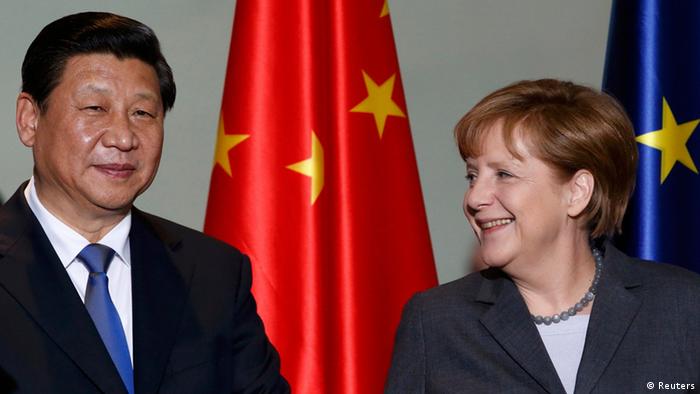How much China means to Germany is obvious given the number of trips Chancellor Merkel has made to the country: seven. But that number also shows just how hard it is to deal with the increasingly assertive Asian giant.
In March this year, Xi Jinping, China's president and chief of its Communist Party, visited Berlin. This spring it was Germany's turn: Foreign Minister Frank-Walter Steinmeier and Economy Minister Sigmar Gabriel traveled to Beijing. In the fall, their Chinese counterparts are expected for intergovernmental talks in Berlin. And yet, despite this abundance of meetings, German Chancellor Angela Merkel is embarking on a three-day state visit to China. No other European leader has met with the Chinese leadership as much as Merkel.
At the moment, there is a certain dynamic in the Sino-German relation. Merkel's current trip is aimed at keeping that momentum going, says Sebastian Heilmann, president of the Mercator Institute for China Studies (MERICS). The analyst believes that the upcoming government consultations will be the main focus of the talks which will also cover issues ranging from technology to education and cultural programs. Not all of those can be negotiated at a lower level, hence the importance of a meeting between the heads of state.
China's springboard?
On Sunday, July 6, Merkel begins her trip in Sichuan, a southwestern Chinese province with roughly 80 million people. Berlin has had a general consulate there for ten years, given that Chengdu is regarded by German companies as a springboard to the relatively underdeveloped western parts of China. Around 160 German firms are registered in Chengdu, among them a Volkswagen factory which the chancellor is set to visit.
From there, Merkel will travel to Beijing, where she will join Prime Minister Li Keqiang for discussions and on Monday, she will meet President Xi Jinping. Liu Liqun, professor of German Studies at the Beijing Foreign Studies University, expects the talks to center on economic issues.
Outside of Europe, China is Germany's most important trading partner. For German plant and machinery installers, the Asian country is their biggest market. But the opposite is also true: Germany is China's first trading partner in Europe. And since political backing is good for business in China, Merkel is travelling with a high-level business delegation, which includes Frank Appel, the head of Deutsche Post, Joe Kaeser of Siemens, Martin Winterkorn, of Volkswagen, Thomas Enders of Airbus und Jürgen Fitschen of Deutsche Bank.
Economy above all
The recently founded Sino-German Advisory Committee on Economy will meet in Beijing for the first time, in the presence of Merkel and her Chinese counterpart, Li Keqiang. Its aim is to identify trade problems between the two countries and "make specific policy recommendations, which will then be analyzed by the respective governments," Heilmann said.
Read more from the source:
http://www.dw.de/germany-and-china-a-special-relationship/a-17759575


.jpg)
Post a Comment